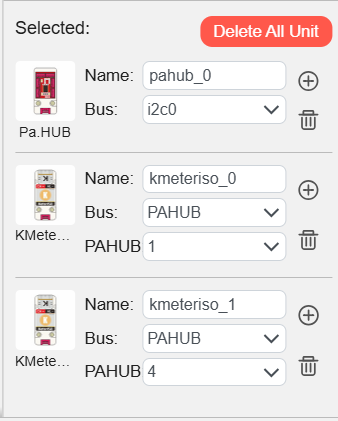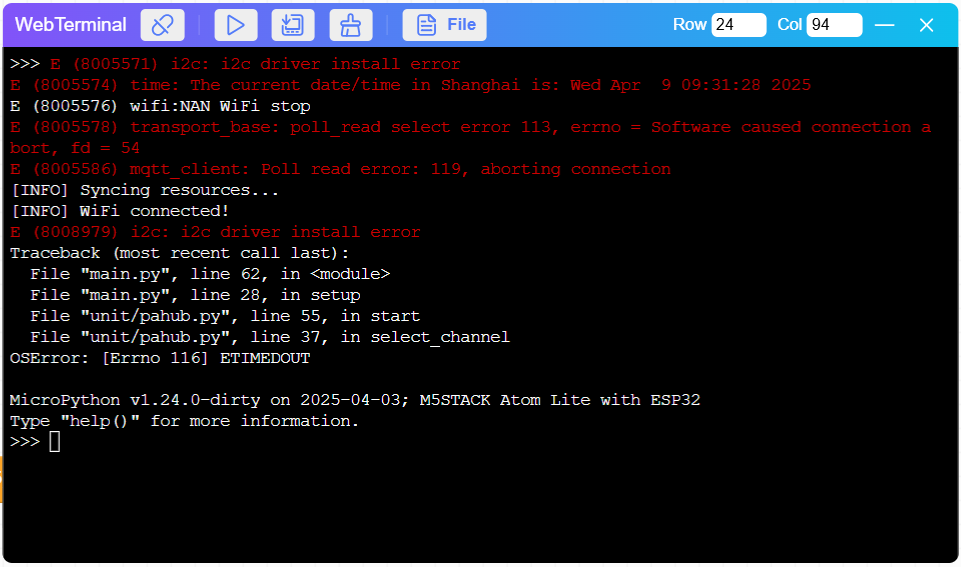Hello,
I’m encountering an issue while using the LoRaWAN EU868 RAK3172(H). I created a program to read temperature data using a KMeterISO sensor in UIFlow2, which works perfectly with the older and simpler LoRaWAN868 ASR6501. However, when I switched to the RAK module and updated the configuration in the "Unit" section of UIFlow2, I encountered the following error: AttributeError: LoRaWANUnit_RUI3
This error appears to come from a library that is automatically added when I configure the RAK module's pins.
While searching for a solution, I visited the product's documentation page:
As a result, I decided to switch to the Arduino IDE. I downloaded the appropriate library and attempted to run an example program, but even the basic example fails to work with this module, i got stuck in the 1st while loop.
According to the official documentation, the library to use is the one following :
The example I tried to compile was:
Examples > LoRaWAN > OTAA,
with the correct pin configuration and OTAA identification (DevEUI, AppEUI, AppKey).
So i try on my own a program but here again, i got stuck in the 1st while loop again. Here's the program that i can compile but not working (I know the OTAA identification is not submit here) :
#include <Wire.h>
#include <M5Unified.h>
#include <M5UnitKmeterISO.h>
#include "rak3172_lorawan.hpp"
#include <string.h>
RAK3172LoRaWAN lorawan;
M5UnitKmeterISO kmeter;
// Définir les paramètres OTAA
#define DEVEUI ""
#define APPEUI ""
#define APPKEY "*********"
// Déclaration des broches pour LoRa
#define TX 15
#define RX 13
void joinCallback(bool status)
{
if (status) {
Serial.println("[LoRaWAN] Join réseau réussi !");
} else {
Serial.println("[LoRaWAN] Échec de la jonction !");
}
}
void sendCallback()
{
Serial.println("[LoRaWAN] Envoi confirmé par le serveur");
}
void errorCallback(char* error)
{
Serial.print("[LoRaWAN] Erreur : ");
Serial.println(error);
}
void setup() {
M5.begin();
Serial.begin(115200);
// Initialisation du capteur KMeterISO
Wire.begin(9, 7); // Utilisation des broches spécifiques pour I2C (SCL, SDA)
while (!kmeter.begin(&Wire, KMETER_DEFAULT_ADDR)) {
Serial.println("Capteur KMeterISO non trouvé !");
delay(1000); // Attente avant de réessayer
}
Serial.println("Capteur KMeterISO initialisé.");
// Initialisation du module LoRaWAN
while (!lorawan.init(&Serial2, RX, TX, RAK3172_BPS_115200)) {
Serial.println("[Init] Failed to initialize module, retrying...");
delay(1000);
}
Serial.println("Module LoRaWAN initialisé.");
// Configuration LoRaWAN
lorawan.onJoin(joinCallback);
lorawan.onSend(sendCallback);
lorawan.onError(errorCallback);
// Configurer OTAA
lorawan.setOTAA(DEVEUI, APPEUI, APPKEY);
// Tentative de jonction au réseau LoRaWAN
if (lorawan.join(true, false, 10, 10)) {
Serial.println("Start Join...");
} else {
Serial.println("Join Fail");
}
// Configuration du mode LoRaWAN
lorawan.setMode(CLASS_A);
lorawan.setLinkCheck(ALLWAYS_LINKCHECK);
lorawan.setDR(4); // Data Rate DR4
Serial.println("Initialisation terminée.");
}
void loop() {
M5.update();
// Lire la température du capteur KMeterISO
float temp = kmeter.getCelsiusTempValue() / 100.0;
Serial.printf("Température du capteur: %.2f °C\n", temp);
// Préparer le message à envoyer
String message = "Temp: " + String(temp, 2) + " °C";
// Envoyer le message via LoRaWAN
if (lorawan.send(message)) {
Serial.println("Données envoyées avec succès !");
} else {
Serial.println("Échec de l'envoi des données.");
}
delay(15000); // Attente de 15 secondes avant de lire et envoyer à nouveau
}


